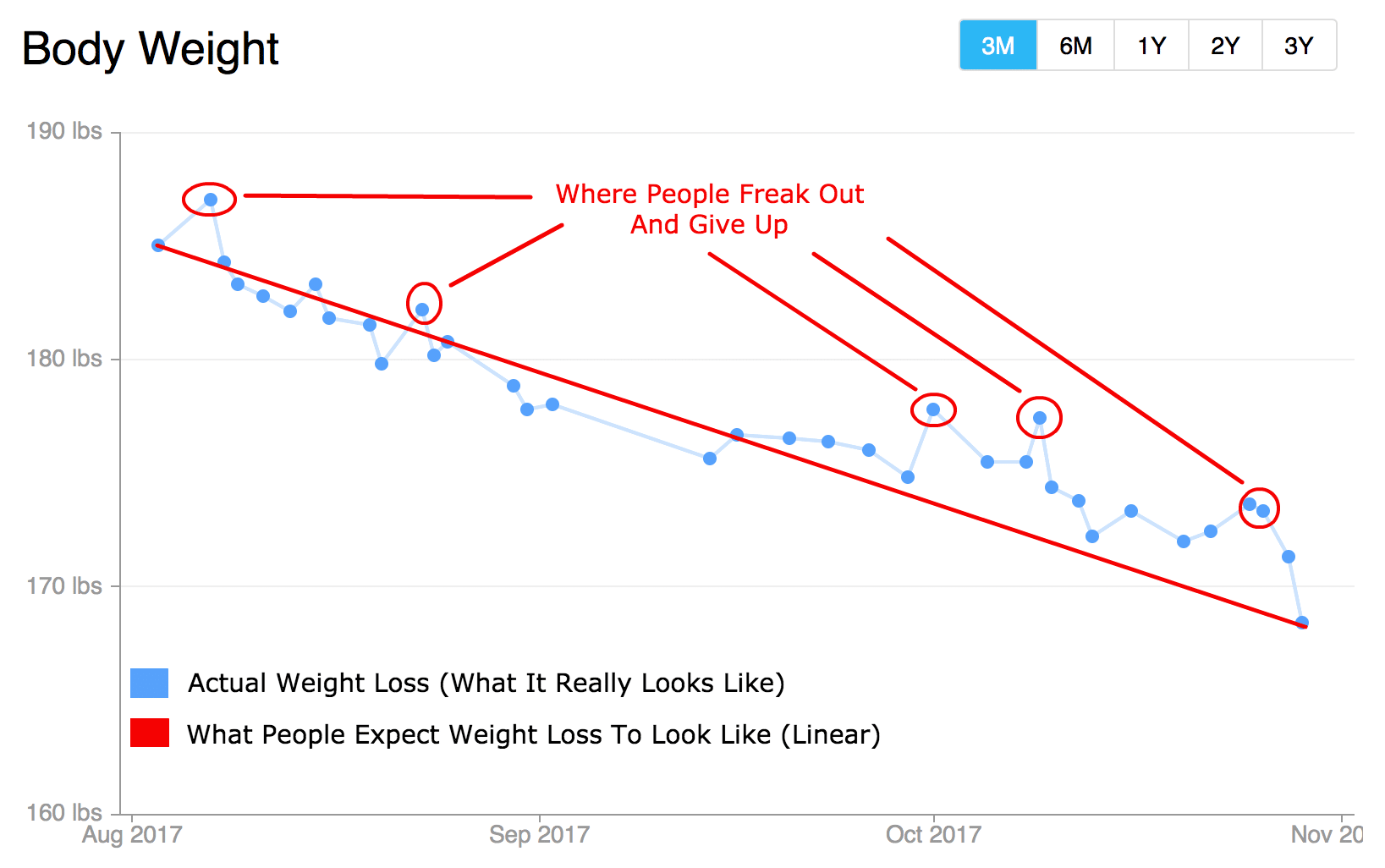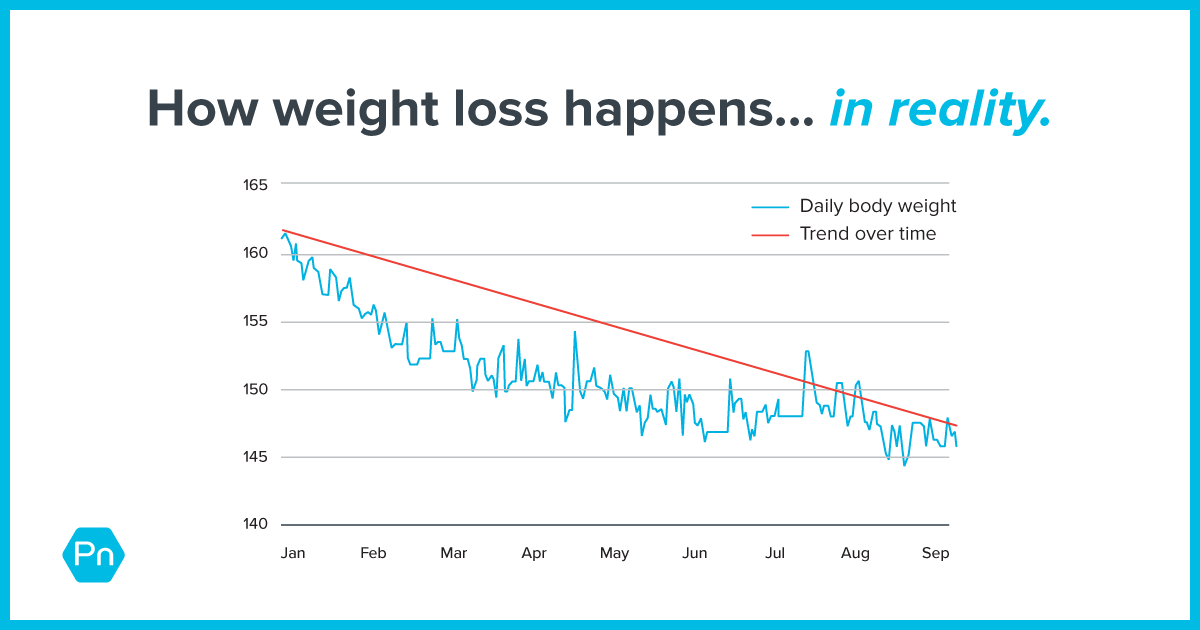The Truth Behind Those Scale Fluctuations and What They Really Mean
You have started your diet.
This is the year that you’ll finally have those summer abs!! This is the year you’ll be turning heads at the beach and getting those double-takes you’ve always wanted.
For those first few weeks, things are going great! You’re accurately tracking your nutrition and crushing your workouts. You’ve even lost 4-7lbs pounds, and those stubborn inches around your waistline are slowly dropping.
As a result, you’re seeing constant movement with your scale weight and seeing some muscular definition.
This is exciting!
However, just when it was looking like this is finally the “diet” that works for you, you hit a hard fat loss plateau. Your body isn’t responding like it used to. Despite this, you stay the course, and you step onto the scale…...
And it goes up four pounds….. 🤯😤🤬🤬🤬🤬🤬
HOW IS THIS EVEN POSSIBLE?!
How did you gain four pounds overnight?!?!
First off, you didn’t gain 4 pounds of body fat overnight. What happens is known as scale fluctuation, and there are a few factors that cause this.
Luckily, these factors are irrelevant to your long-term progress and are completely normal and expected!!
Along your weight loss journey, you cannot control your weight day to day as your progress will never be linear, and no, you’re not losing muscle or gaining body fat every time the scale swings.
So, let’s take a closer look at what causes your weight to fluctuate as there are seven main reasons why.
1) Higher than Normal Sodium Intake:
If you eat more salt than usual in a given day, your body will retain water, causing your body weight to increase. This is the exact same thing as if you drink a bottle of water before stepping onto the scale.
The same thing happens if you eat less salt than usual. You may weigh less because you aren’t holding onto as much water as you normally do. This fluctuation in either direction has nothing to do with your fat loss or gain, as it’s simply your body holding onto more water.
2) Carbohydrates:
Let me be clear: Carbohydrates do NOT make you fat. When you eat carbs, they’re stored in your body (mostly in the muscles) as glycogen. As you eat carbs, your body will hold onto water, which causes your scale weight to go up. However, as you know, that doesn’t equate to you gaining weight.
For example, let’s assume you’ve been eating fewer carbs, causing your muscle glycogen level to be low. Then you have a fun night out with some friends, and you eat more than usual (i.e., pizza, beer), etc. Your glycogen stores went from low to full, and you can gain up to 6 lbs of scale weight overnight!
On the flip side, if you’re consistently eating fewer carbs, this can explain why you lose weight so quickly (i.e., decreased glycogen stores and less water retention). This is why people rapidly lose weight when they start a low-carb diet like keto. By eliminating almost all carbohydrates from your diet will cause a rapid weight drop because you’re losing water weight (not body fat).
Unfortunately, this is also why those who stop keto end up gaining all their weight back (and more) as soon as they incorporate carbs back into their diet. This is why I tell all my online clients: how you lose weight is how you’ll sustain it! Most people are unable to give up carbs forever, so if you only know. how to restrict carbs, then you’ll regain that same weight all over again.
3) Eating/Drinking Later in the Day:
Eating late does not make you gain fat. However, if you’re eating later than usual, your weight may spike the next morning simply because you have more food in your stomach.
Again, it is completely normal and reasonable. The scale weight will be higher because you have more substances (i.e., water) in your body; therefore, you weigh more.
This is the same thing as if you weighed yourself and drank a bunch of water before weighting yourself.
4) Weight Lifting:
After a heavy lifting session, you may have noticed yourself weighing more. This is completely normal and for good reason: lifting weights damages your muscles (so they can become stronger), but when damaged, your muscles will retain more water and glycogen.
This is especially true after lower body workout days. This is temporary and completely normal.
5) You Need to Take A 💩💩💩
You can store a bit of weight within our large intestines. There really isn’t much science needed to support this, as It was internal weight, and now it’s external weight. But if you want to run your own experiment, weigh yourself before and afterward, as you’ll be surprised by how much weight you lose.
This is very similar to eating/drinking later in the day. Again, this is just temporary and completely normal.
6) Menstrual Cycle
Now, I’m not an expert in women’s health, but it’s important to know your weight will spike the week leading up to your period. That weight spike will fluctuate from woman to woman as it may be as small as 1-3lb or as large as 3-5lbs. It’s completely individualized and completely normal!
Keep this in mind as you’re trying to lose weight, so it’s best to compare your weight from a month-to-month perspective to standardize the progress you’re making.
7) Stress
You might have heard that cortisol (the stress hormone) is a “bad” thing, which is the furthest from the truth. Stress isn’t necessarily a bad thing, as cortisol can help reduce inflammation, control blood sugar and blood pressure, and improve memory formulation.
However, people believe stress can make you fat because cortisol can suppress fat burning, which simply isn’t true. This is a massive oversimplification of how cortisol and your body work.
Stress doesn’t make you fat; eating too many calories makes you fat. Obviously, stress can impact your behavior (i.e., stress eating or eating too little) and can cause the body to hold onto additional water. However, stress in and by itself doesn’t cause you to become fat.
Why You Should Weight Yourself Every Day.
If you’re this far in the article, you know the main reasons behind those scale fluctuations and why your weight will not go down every single day or week.
However, even understanding this can be difficult not to get upset on those weight spike days. This is why I want you to weigh yourself every day, not with the hope of losing weight, but to see those numbers as data.
By doing so, you’ll start seeing your individual weight-ins as data points rather than as judging your self-worth. These data points will clearly show if you’re making progress and whether you’re as consistent as you thought.
With enough data points, we can see a clear trendline. If the trendline is straighter, then we know you’re at maintenance. If the trendline is treading upwards, you’re in a calorie surplus/gaining weight. If the trendline is treading downward, you’re in a calorie deficit/losing weight.
Since we’re focused on weight loss, we will focus on the weight loss trendlines as they differ from person to person. While you’ll see individual weight spikes, you’ll notice a downward trend on your weight loss journey. This allows you to reasonably predict and know ahead of time when your weight will spike and when your weight will drop.
Again, this is why we want to look at your progress from a long-term perspective (i.e., week to week and month to month). We want to focus on the overall trendline, not the individual weight in’s (aka data) as this tells the true story.
Over the years, I’ve noticed my online client’s progress follows one of the following patterns.
Weight Fluctuation Loss Pattern #1: The Cliff
If this is your pattern, you should see quick weight loss within the first few days (~1-3lbs), and then your weight will stall for some time. This is completely normal, and if you stay consistent with your nutrition, your weight will continue its downward trend. Then, like before, it will spike back up. This pattern will continue as you progress further along your weight loss journey.
Unfortunately, most people don’t give it enough time to work as they become “too frustrated” by the first few spikes. They don’t realize that these weight spikes are completely normal and expected!
They will tell themselves that it’s not working and quit. However, if they stay consistent and understand that weight fluctuations are a part of the process, they will continue to lose weight slowly and sustainably!!
This weight loss pattern is a perfect example of why you need to remove your emotions and look at numbers as data.
Don’t get too excited as your weight drops, and don’t allow the stagnant days or upswings to get you down. It’s all a part of the process, as it can literally be any of the things I’ve mentioned earlier!
Weight Loss Fluctuation Pattern 2: The Great Plateau
If this is your weight loss pattern, you’ll likely not see any progress for the first week. Remember, this doesn’t mean it isn’t working but rather just another common weight loss pattern.
Stay consistent with your exercise, nutrition, and habits, as you’ll see a definitive drop on the scale. This doesn’t mean it won’t spike back up (for the above reasons), but it’s a part of the process.
If your weight follows this graph, then you’ll see your weight resemble a downward staircase with sharp drops. Most people quit here because the scale hasn’t moved “forever,” and they think they’ve hit a plateau. Don’t fall for this mindset!!
Your weight will continue to drop over time. It’s not happening according to your self-imposed timelines and as quickly as you want. Stay consistent!! Don’t change your exercise, nutrition, or habits. Just stay the course and you will achieve your goal.
Weight Loss Fluctuation Pattern #3: The Rollercoaster
For the third and final pattern, this is a combination of the previous two. If your weight follows this trend, you’ll likely experience a quick drop followed by a brief “plateau,” which could last a week.
Then the pattern starts again with a sudden drop followed by another plateau. Remember: Spikes and plateaus are completely normal. It doesn’t mean you’re failing or the diet isn’t working. It simply means you are human, and you need to keep doing what you’re doing.
Of the three patterns, this is my own personal pattern. It’s frustrating and annoying as hell. However, we cannot choose which one of these patterns we fall into. It’s best to identify which one of these we identify and understand the journey ahead.
Do you know the other two critical factors to whether your nutritional program succeeds or not?
Accountability
Structure and a clear plan to follow
My online coaching service provides you with both. At Mack Performance, I firmly believe that the best diet is the one you enjoy while making long-term, objective-based progress.
Together, we’ll create a tailored plan to get you to the physique you’ve always wanted and expertly guide you through every step of your transformation.






